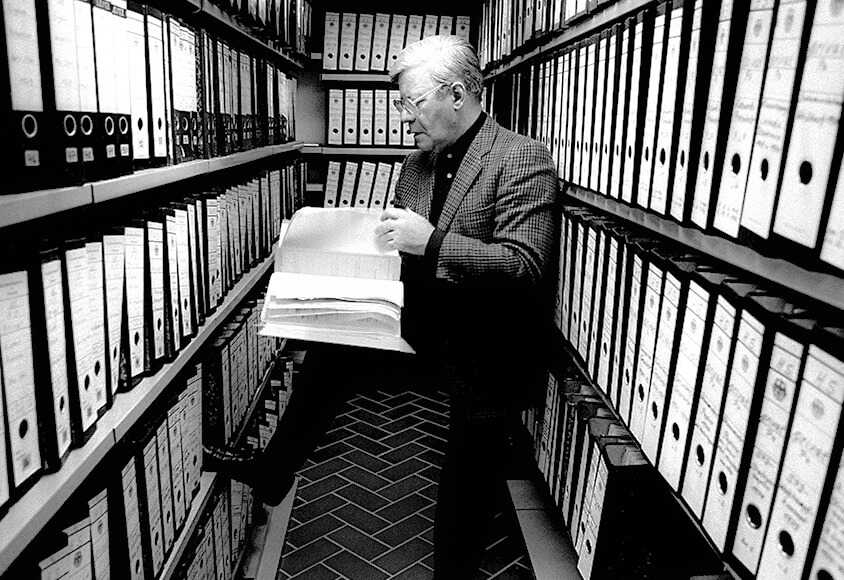Even the oldest cultures for which we have written records had well-organised collections of their paperworks (Friedrich 2013). Over time, archives grew out of these collections, preserving statutory rights and guarantees such as contracts, certificates and political correspondence. Consequently, archives became an important tool for enforcing the rule of law.
In the 18th century, estates were archived for the first time. Since then, personal archives have emerged as an indispensable tool for historians recording the impact of individuals and providing important alternative evidence to official accounts (Friedrich 2013). These personal archives give insights into everyday life and social history. Today, they are an essential element of a pluralist, democratic society.
Making history accessible to subsequent generations
Helmut Schmidt, who served as chancellor of West Germany from 1974 to 1982, collected personal documents and family memories from an early stage. After the majority of his collection was destroyed by a bombing raid on Hamburg in 1943, Schmidt restarted his collection of memories and documents, creating the basis for his now extensive personal archive. The personal was supplemented by the political when Schmidt joined the centre-left Social Democratic Party of Germany (SPD) in May 1946. The constantly updated repository covers the decades between 1943 and 2015 and contains statements relating to Schmidt’s political work, personal reflections and information on major historical events and societal developments. By the end of his life, the collection had grown to a total of 3,500 file folders and around 400 photo albums.
Helmut Schmidt had a clear message to German historians when addressing them at a conference in 1978: “History affects every citizen!” (HSA EA 149). In Schmidt’s view, people not only need to come to terms with history, they also need to make history accessible to subsequent generations. Being aware of this historical significance of archives for politics and research, the former chancellor ensured that his personal archive would be independent of authorities, maintained under the provisions of archival law and made accessible to the public. For Schmidt, the focus when handling the social function of his estate was clear: it should be able to be scrutinised and made available to academics and researchers to reveal and understand his political decisions. Schmidt recognised that archives are an essential foundation for contemporary political considerations and decision-making.
Supporting the rule of law and democracy
Schmidt’s estate is of exceptional societal and historical value when considering his political, economic and cultural impact. The archives – now called the Helmut Schmidt-Archiv (HSA) – are among the most comprehensive and long-running of any German politician in the 20th century. Together with the collections from his brother Wolfgang, his wife Hannelore “Loki” Schmidt and his close friend Karl-Wilhelm Berkhan, the HSA forms a legacy that goes well beyond a personal repository. It documents and preserves the decisions and actions taken by Schmidt, as well as his reflections upon them. It is an impressive example of how archives serve as a tool for supporting the rule of law and democracy.
The HSA reflects the political discourse of the decades in which they were formed and provides deep insights into the history of the Federal Republic of Germany, its transatlantic and international connections and, in particular, the process of European unification in the 20th century. But as a repository of source material and as a site for imparting history, the HSA is above all a workshop for political memory. It is a place to conduct historical and political research and for promoting an awareness of history through various formats. As a repository for historical source material, the HSA provides a good introduction into the nature of historical archive work and shows how an everyday file becomes an authentic, historical source. The archive is open to students for learning and as an important cultural experience that facilitates a particular kind of societal-political discussion.
Then and now: archives as bones of contention
Archives secure cultural treasures and contemporary memories for the future, allowing insights into past events and making historiography possible in the first place. Publicly accessible archives are a symbol of democratic states, they are essential for a nation’s collective memory and support individual identity-finding (Hering 2019). It is therefore no surprise that archives have become bones of political contention ever since they came into existence. The political and symbolic value of archives have made them an attractive target (Friedrich 2013).
This systemic importance of archives also becomes apparent in Ukraine, where Russian troops have deliberately destroyed Ukrainian cultural heritage since the start of the Russian invasion. Fearing archives as resources for speaking up for Ukrainian sovereignty and independence, archives have been targeted explicitly. Fortunately, Western countries are donating packaging materials and are assisting with digitisation, including making servers available for this purpose and backing up Ukrainian websites. The goal is to facilitate cultural restoration after the end of the Russian invasion, so as to not conceal history for future generations.
Franziska Zollweg (@_Franz_ka_) is the academic head of the correspondence project at the Helmut Schmidt-Archiv.
Bilbliography
Friedrich, M. (2013): Die Geburt des Archivs. Eine Wissensgeschichte, Munich: De Gruyter.
Helmut Schmidt-Archiv [HSA]: EA 149, Ansprache auf dem Historikerkongress, 4 October 1978.
Hering, R. (2019): Wer nicht archiviert, wird nicht erinnert. Archive als Gedächtnisort der demokratischen Gesellschaft, Auskunft 39 (1-2), 9-14.




